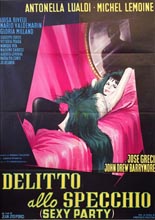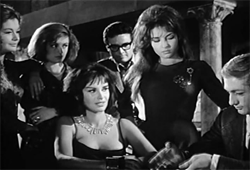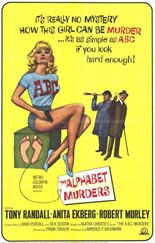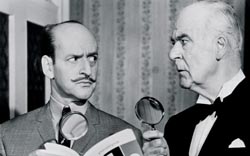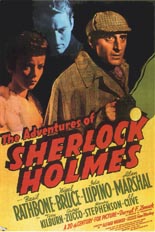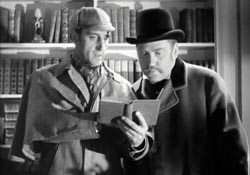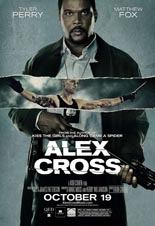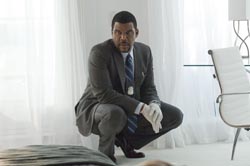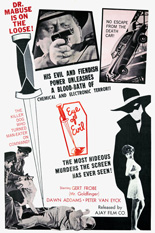
 Fritz Lang’s final film, The Thousand Eyes of Dr. Mabuse, marked his return to the pulp series he kicked off with 1922’s Dr. Mabuse: The Gambler. Like his 1933 entry, The Testament of Dr. Mabuse, this one is not without some great sequences, but suffers from an overly convoluted plot and slow pacing. It’s well-directed, although not all that well-plotted.
Fritz Lang’s final film, The Thousand Eyes of Dr. Mabuse, marked his return to the pulp series he kicked off with 1922’s Dr. Mabuse: The Gambler. Like his 1933 entry, The Testament of Dr. Mabuse, this one is not without some great sequences, but suffers from an overly convoluted plot and slow pacing. It’s well-directed, although not all that well-plotted.
Beginning with an assassination at a stoplight — utilizing a secret weapon that sends thin steel needles through human skulls — Thousand Eyes centers around the Hotel Luxor, where several recent visitors ended up murdered, baffling the local police (including Goldfinger himself, Gert Frobe, who can barely keep his pants up). The hotel rooms are bugged with cameras and have two-way mirrors, setting the course for an intriguing angle of voyeurism that never comes to be.
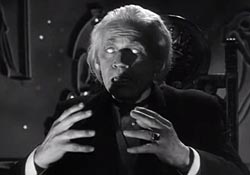 As with other Mabuse sequels, the good doctor is deceased, so it’s merely his “spirit” doing all the dirty work through other humans. While it sounds really cool, the movie isn’t even a quarter as exciting as its poster. As good as Lang was at what he did (see: Metropolis for the man at the height of his visual powers — and honestly, you must), the Lang-less, low-rent Dr. Mabuse vs. Scotland Yard so far remains my favorite in the German crime-cinema mainstay. The goofier, the better. —Rod Lott
As with other Mabuse sequels, the good doctor is deceased, so it’s merely his “spirit” doing all the dirty work through other humans. While it sounds really cool, the movie isn’t even a quarter as exciting as its poster. As good as Lang was at what he did (see: Metropolis for the man at the height of his visual powers — and honestly, you must), the Lang-less, low-rent Dr. Mabuse vs. Scotland Yard so far remains my favorite in the German crime-cinema mainstay. The goofier, the better. —Rod Lott

